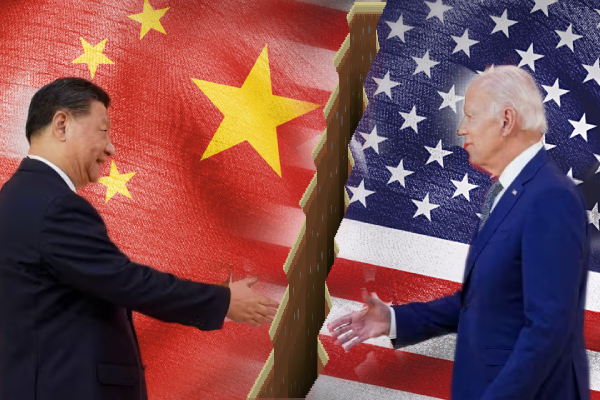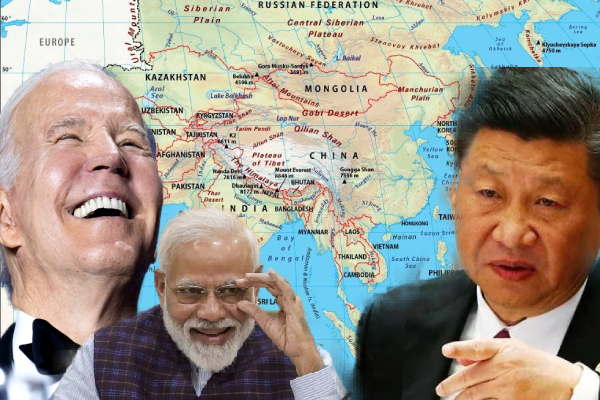The United States of America appears to be asserting its influence in Asia to discourage China, once again positioning itself as a prominent figure in the region.
However, does this imply that the United States seeks peace in Asia? Not necessarily. The United States primarily prioritizes its own interests, succinctly captured by Henry Kissinger’s description of US foreign policy: “America has no permanent friends or enemies, only interests.”
This blog aims to delve into the reasons why the United States continues to wield significant power in Asia and why such a position aligns with the country’s interests.
Table of Contents
Countering False Narrative
The false narrative suggesting the declining hegemony of the USA in Asia has been perpetuated for a long time now, but it does not reflect the reality on the ground.
The US share of global GDP is 24% which is nearly one-fourth of global GDP and the USA continues to spend more on defence than the next 10 countries combined, including India and China.
In the past couple of years, the United States has achieved notable advancements in Asia. These accomplishments encompass urging Japan to increase its defence spending as a response to China, fostering the normalization of relations between Tokyo and Seoul, revitalizing defence cooperation with the Philippines, establishing a strategic partnership agreement with Communist Vietnam, introducing the AUKUS partnership alongside Australia and the UK, reinforcing the Quad alliance, and elevating bilateral relations with India.
So, it would be foolish to consider the USA as a declining superpower and the recent dip in China’s economy opines that China would not be able to surpass the US economy any time soon.
United States Love Enemies
The USA faces adversaries across various regions worldwide, with Russia posing a threat in Europe, Iran in the Middle East, and China in the Asia-Pacific region. Consequently, U.S. foreign policy in these areas is strategically devised to counteract the influence of these rival nations. Countries grappling with the aggression from these adversaries often turn to the United States for support.
During his tenure, former US President Donald Trump raised concerns by threatening to withdraw from NATO, leading to perceptions of waning American interest in European affairs. However, with the inauguration of President Joe Biden and the unfolding Russia-Ukraine war, the USA seized the opportunity to bolster NATO. This effort proved successful, with Finland joining as the 31st member, reestablishing a strong American presence in Europe.
In the realm of Asia-Pacific, China’s actions have prompted the United States to strategically align with key countries such as Japan, Taiwan, South Korea, the Philippines, Australia, Vietnam, and India. These nations, facing the brunt of China’s aggression, have become crucial allies as the USA seeks to safeguard its interests in the region.
Similarly, in the Middle East, Iran’s support for terrorist groups against countries like Israel and Saudi Arabia has driven these nations to seek security assistance from the United States. Saudi Arabia, the largest economy in the region, and Israel, a nuclear power, have become instruments in the hands of the United States, allowing for sustained American influence in the Middle East
USA's Asia Strategy

The United States’ strategy in Asia aims to counterbalance China’s influence and bolster its own presence in the region by forming alliances with nations adversely impacted by Chinese aggression. While historical U.S. relations with Asian countries primarily centered around trade and development, rather than military cooperation, this has left many nations susceptible to Chinese assertiveness.
China’s strategy involves clearing the path for its regional ambitions by countering formidable players, notably the USA, engaging in prolonged multilateral discussions on territorial disputes it created. Beijing utilizes economics as a primary tool, fostering dependence in its neighbours and rendering them less capable of resisting Chinese demands.
In response to these vulnerabilities, the USA has shifted its Asia policy. It now encourages its Asian partners to enhance their own security by increasing military spending. In return, the U.S. offers economic opportunities, access to its market, reduced tariffs, and advanced technology, enabling these partners to grow financially and allocate more resources to their defence.
The QUAD grouping, comprising India, the USA, Australia, and Japan, was elevated to summit level in 2021. While China views QUAD as a counter to its influence in the Indo-Pacific, it is not a military alliance, as exemplified by India’s non-participation in QUAD’s freedom of navigation operations.
The AUKUS defence deal involves Australia procuring nuclear-powered submarines from the USA and the UK to counter China’s aggression in the Pacific. South Korea is engaging in discussions with the USA to secure critical supply chains and address China’s restrictive policies in areas like semiconductors, robotics, and advanced manufacturing, emphasizing the intertwining of economic and security considerations.
In June 2023, the Philippines conducted joint naval drills with the USA and Japan near Bataan province, located along the South China Sea. Singapore granted the USA access to its naval and air bases.
Washington recognizes that simply lifting trade restrictions or promoting American principles may not be sufficient to garner support from Asian partners; thus, it is taking additional measures.
Presidential Elections 2024 and a Leap Towards Isolationism
The outcome of the 2024 US presidential elections will significantly impact the region. Considering Joe Biden’s approval ratings, there is a high likelihood that either Donald Trump or Vivek Ramaswamy will assume the role of the next US president. Regardless of the victor, it appears that the policies implemented will be consistent and potentially propel the USA toward isolation.
In the case of Vivek Ramaswamy, Ukraine does not seem to be a priority. His peace plan suggests allowing Russia to retain territories gained in Ukraine, contingent upon Putin severing Moscow’s alliance with Beijing. Ramaswamy has also asserted that the USA will safeguard Taiwan’s security until 2028, during which time the US aims to achieve self-reliance in semiconductor manufacturing. Clearly, Ramaswamy’s strategic approach is inward-looking, which may contradict the current role of the USA in the Asia-Pacific region.
Ramaswamy advocates for US allies to manage their own security challenges by increasing defense investments. He specifically urges Taiwan to double its military expenditure to 4-5% of GDP.
On the other hand, Donald Trump has expressed his intent to withdraw from regional trade deals signed by the Biden administration with 13 Asian countries, citing concerns about job losses and negative impacts on US manufacturing. Notably, Trump withdrew from the Trans-Pacific Partnership (TPP) during his presidency.
Trump has also threatened to withdraw from NATO if his demands are not met and withdrew from the World Health Organization (WHO), alleging that other countries were not contributing proportionately to the WHO budget relative to their GDP.
Interestingly, Vivek Ramaswamy has praised Donald Trump as the greatest US President, and Trump has reciprocated by endorsing Ramaswamy as a highly competent choice for Vice President if he were to be re-elected. Their shared geopolitical priorities suggest that, regardless of who become the US President be it Trump or Ramaswamy, the USA is likely to take a significant step towards isolationism.
Conclusion
The United States derives significant strength from its alliance system in Asia, poised to counter China’s aggression in the Asia-Pacific region. Through the reinforcement of nations with a vested interest in defending themselves against China’s belligerence, the USA has bolstered the deterrent capabilities of Asian nations against Beijing.
However, it is crucial for the United States’ partners in Asia to take charge of their own security by making substantial investments in their military capabilities. This is driven by the realization that reliance on the USA alone is not sufficient, as the U.S. is primarily focused on safeguarding its own interests and may not be perceived as an unwavering guarantor of security for its allies in the region.
